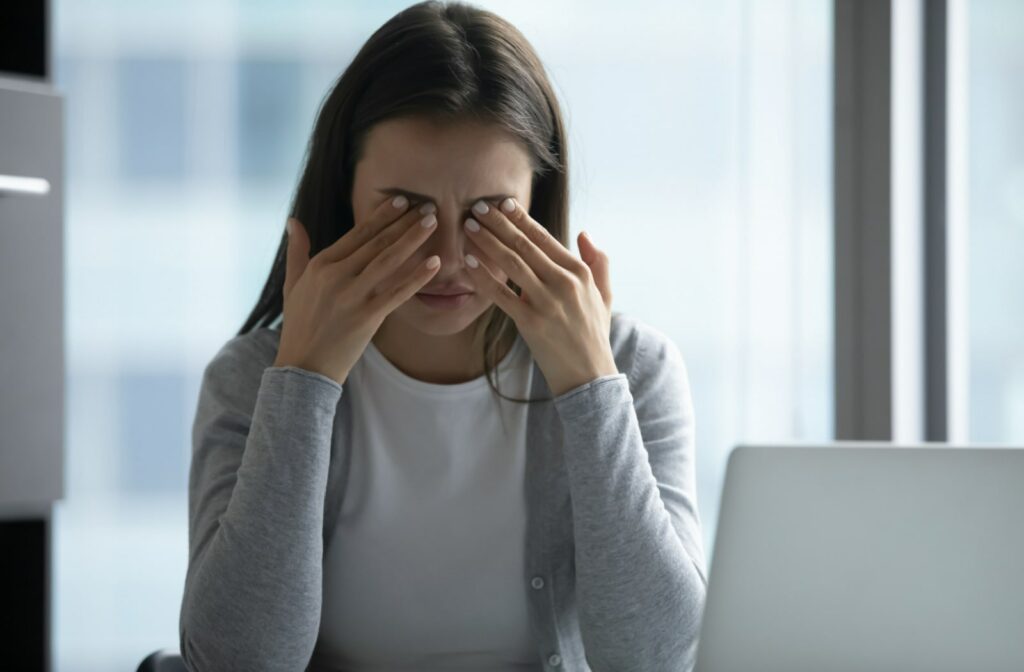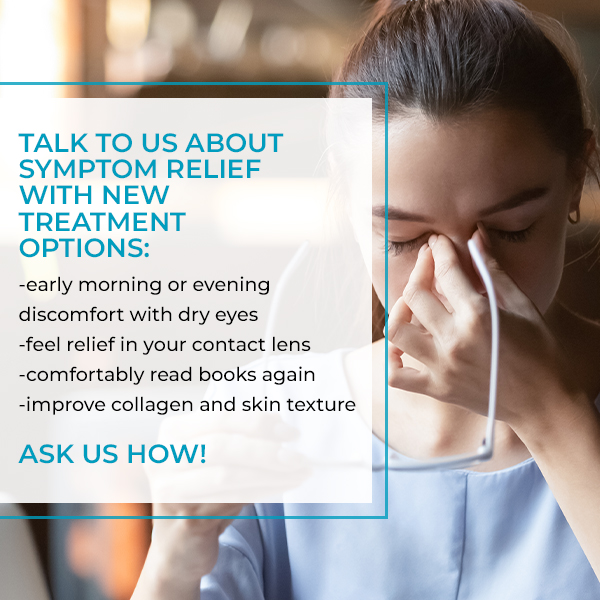Dry eyes can be a frustrating and uncomfortable experience that affects over 16 million Americans. While it’s more common in people over 50, people of any age can get that scratchy feeling. Fortunately, there are modern, effective solutions to dry eyes.
If you’re simply dealing with the symptoms, it may be hard to know if dry eye disease is the problem. Dry eyes share some symptoms with other vision issues, such as digital eye strain or certain diseases. Dry eye disease can cause redness, burning, and even blurriness.
Your optometrist can give you a convenient, comprehensive eye exam that may uncover the cause of your irritation.
What Causes Dry Eyes?
Dry eyes can happen in one of 2 ways. Either your eyes don’t produce enough tears or they produce tears of poor quality. There’s a lot that goes into creating healthy tears—more than you might expect. Your tear film is made of 3 layers to keep your eyes hydrated and healthy:
- The inner mucus layer keeps your tear stuck against your eye.
- The watery middle layer is the thickest and is full of water and protein that hydrates your eye and repels bacteria.
- The outer oily layer keeps the tear smooth enough to see through. It also prevents the other layers from evaporating, a vital part of avoiding dry eyes.
We generally make fewer tears as we age, which is why dry eyes are more common in older folks, but that’s actually a rarer cause of dry eyes. In fact, dry eyes caused by a lack of tear production only accounts for 10% of dry eye cases.
What’s much more common is evaporative dry eyes, where there’s a problem with the outer oily layer of your tear film. This is typically caused by meibomian gland dysfunction (MGD), a common condition where the meibomian glands that help create the oily layer are inflamed or blocked.
When blocked, they can’t produce the meibum that prevents your tears from evaporating. No tears means no hydration, and leads to more dryness.

Dry Eyes & Blurriness
Blurry vision is just one of the symptoms of dry eyes. Others include:
- Stinging, burning, or scratchiness
- Red eyes
- Light sensitivity
- Stringy mucus discharge
- Watering
But how do dry eyes make your vision blurry? There are a few different ways.
Overproduction of Tears
Have you ever looked through a glass of water and seen the images on the other side bend and distort? This effect is called refraction, which is when light rays are bent (refracted) by passing through a lens or water. In fact, the same thing happens in your eye to allow you to see clearly.
So, if you get a lot of water on the front of your eye, you’ll likely have trouble seeing. It may seem counterintuitive, but evaporative dry eye can produce too many tears! Our body knows our eyes are dry, so it may overcompensate with more tears.
The only problem is our tears keep evaporating. And without the meibum to keep the outer oily layer smooth, our tear film starts refracting light in ways it shouldn’t. So, in the end, our eyes stay dry, but we have to deal with blurry vision and further discomfort.
Corneal Damage
Our cornea sits at the front of our eyes, over the iris and the pupil. The cornea works with the lens inside our eye to focus light onto the retina, giving us clear vision.
However, dryness can damage the cornea. Normally the tear film does a decent job of keeping out bacteria and foreign objects. This all changes with dry eyes. If thee foreign debris builds up, it could scatter light before it can enter the eye, causing things to become blurry.
Being exposed to the elements could even directly damage your cornea. Tiny abrasions or scratches could affect how you see, leading to blurriness or permanent eye damage.
Contact Lenses
Dry eyes may make it hard to wear contact lenses. While contact lenses are great for correcting common refractive errors, they fit your eyes precisely. If dry eyes change how contacts sit on your eye, this can lead to blurriness.
Also, some contact lenses can absorb moisture from your eye. When you don’t have enough moisture to share, this can worsen already irritating dry eye symptoms.
Other Causes of Blurry Vision
It’s worth noting that blurriness isn’t only caused by dry eyes. It’s a relatively common symptom of many eye and vision conditions. Similarly, dry eyes can be the result of other health issues. Sjögren’s syndrome, for example, can affect moisture all over the body and is an autoimmune condition.
Visiting your optometrist for a comprehensive eye exam can help you find the root cause of your blurry vision and dry eyes. With a proactive approach to eye health, you can often detect and treat issues before they become serious problems.
Relief from Dry Eyes
Ideally, treating your dry eyes should also help you see clearer. Some common treatments for dry eyes include:
- Artificial tears: Over-the-counter eye drops may soothe dry eye symptoms and help you find quick relief, though you should follow the directions and ensure you don’t overuse them.
- Prescription eye drops: An optometrist can prescribe eye drops to rejuvenate your tear film or break down blockages.
- Warming treatments: Treatments using intense pulsed light (IPL) therapy use heat and massages to break down blockages in your meibomian glands.
- Punctal plugs: A doctor can insert sterile medical devices into your tear ducts to prevent tears from draining too fast using punctal occlusion surgery.
- Eyelid scrubs: Depending on the cause of your dry eyes, eyelid scrubs can clean the eyelids and may soothe irritation and inflammation.
- Nutritional supplements: Omega-3 fatty acids, most commonly found in fatty fish, have been shown to lower the risk of dry eyes.
Innovative Treatments for Dry Eyes in Daniel Island
Treatment for dry eyes and blurriness begins with understanding why it’s happening. That’s why Daniel Island Eye Care uses comprehensive assessment techniques to uncover the cause before suggesting treatment options.
If you’re looking for the solution to your dry eyes, book an appointment today and learn more about how we can help.





